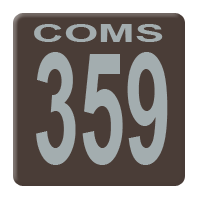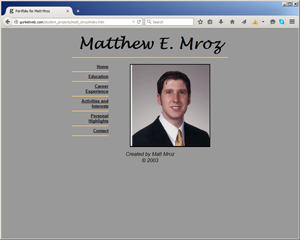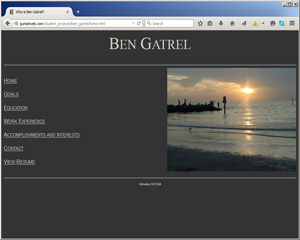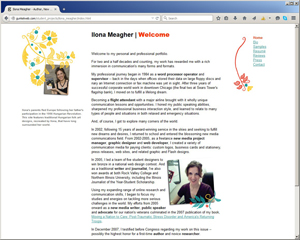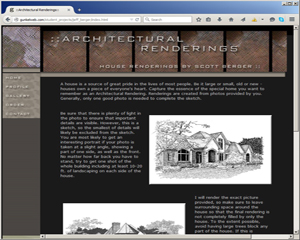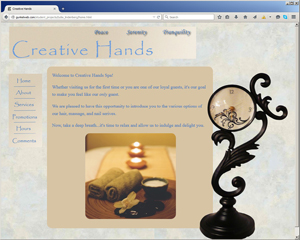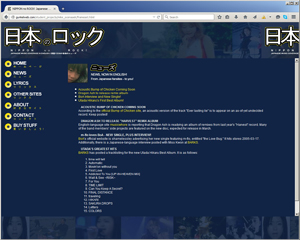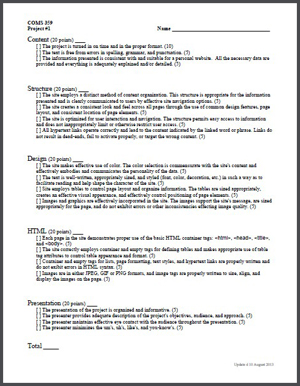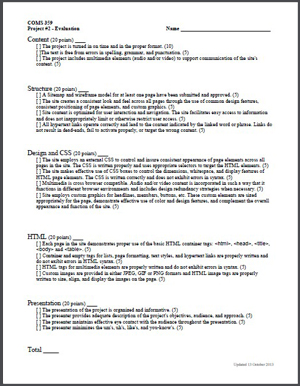Preparation
Students are responsible for reading and preparing all assigned class materials in accordance with the course calendar. Because the readings are aimed at developing practical skills with HTML/CSS and web page design, students are encouraged to try to execute instructions provided in the text prior to class meetings. Consequently, reading in this course does not consist in accessing and comprehending information but in learning how to apply concrete skills to specific web programming and design challenges.Course Structure
This class is not a lecture-course. It is a practicum. Therefore, the responsibility for working through the material and structuring an effective learning environment falls to each member of the course.Attendance
Because the environment of the course is interactive and collaborative, it is necessary that students attend and participate in every class meeting. Attendance is, therefore, mandatory. Students are permitted two (2) unexcused absences. After that, the final grade will be reduced by 20 points per additional absence. This guideline is not inflexible and is subject to change due to individual circumstances. This alteration, however, must be confirmed with the instructor. When possible, this should be accomplished before the additional absence(s). In the case of any absence, it is the student's responsibility to make-up the missed work by obtaining notes from classmates or reading the assigned material. The instructor will not provide individual instruction for students who have missed a regularly scheduled class meeting.Student Assessment
Student learning and achievement is assessed and evaluated by four coding exercises and two web projects.1. Exercises - As we progress through the web languages of HTML and CSS, student learning and proficiency will be evaluated and assessed with periodic take-home exercises. These coding exercises will challenge students to put into practice and demonstrate proficiency with the web programming concepts developed during classroom demonstrations. The exercises will be assigned at the end of the class period with the expectation that students will do the work outside class and turn it in at the beginning of the next class period. Students who miss an the assignment of an exercise due to an excused absence, will have one additional class period to make-up the missed opportunity.
2. Projects - Students will design and develop two web projects: a personal website and a web application to support e-commerce.
General Requirements
Project Two - The second project consists of a design for e-commerce. E-commerce is the use of the web to sell a product or a service. For this reason, an e-commerce site should provide basic company information, detailed product/service data, customer support options, and the ability for users to order and/or purchase products and services directly online.
This project will involve a service learning component, requiring students to work with and design for a third-party content provider or client. Clients may be corporations, small businesses, non-profit organizations, community/campus groups, or individuals. Students will work with their client to identify specific project objectives, to gather and develop site content, and to employ web program and design skills to create an effective web application that accomplishes the client's goals and meets their objectives. This approach provides practical "on-the-job training" and results in actual web design and programming examples that students may include in their portfolio.
- Projects must be turned in on time. Exact due dates are indicated on the course calendar. The first project will be completed by the midterm; the second project will be due during the final week of classes.
- Projects may be delivered either on fixed media (e.g. USB jump drive) or over the Internet. If submitting fixed media, the device must be labeled with the title of the project, the student's name and email address, and the name of the initial page. If submitting online, students should turn-in a document indicating the student's name, the project title, and the site's URL. Online projects must be complete and fully functional by the scheduled due date.
- Projects must be written in a code editor, like NotePad++ on the Windows platform or TextWrangler on the Mac OS. Students may not use commercially available website builders (i.e. Abobe Muse, WIX.com, Bubble, WordPress, etc.). Students may use CSS frameworks (i.e. Pure.css, Bootstrap, etc.) and html/css libraries. Use of these resources must be clearly indicated in the file's source code.
- Projects will be presented to the seminar in accordance with the due dates published in the course calendar. These presentations should be approximately 4-5 minutes in length. They should introduce the project, demonstrate the design approach, and provide an overview of the content. The presentations are an opportunity for course participants to view and learn from the experiences of each other.
Project Two - The second project consists of a design for e-commerce. E-commerce is the use of the web to sell a product or a service. For this reason, an e-commerce site should provide basic company information, detailed product/service data, customer support options, and the ability for users to order and/or purchase products and services directly online.
This project will involve a service learning component, requiring students to work with and design for a third-party content provider or client. Clients may be corporations, small businesses, non-profit organizations, community/campus groups, or individuals. Students will work with their client to identify specific project objectives, to gather and develop site content, and to employ web program and design skills to create an effective web application that accomplishes the client's goals and meets their objectives. This approach provides practical "on-the-job training" and results in actual web design and programming examples that students may include in their portfolio.
Grading
Student projects will be evaluated following a standard evaluation rubric. The rubric is divided into five categories: content, structure, design, HTML, and presentation. Because each project introduces new design challenges, HTML/CSS instructions, and interactive features, each project has its own evaluation rubric. Students are encouraged to use the evaluation rubric to guide their work and to check their designs prior to formal evaluation by the instructor.
- Evaluation Distribution
- Exercises = 100 points (4 x 25 points per exercise)
- Project One = 100 points
- Project Two = 100 points
- Grade Scale
- A = 280-300
- A- = 270-279
- B+ = 260-269
- B = 250-259
- B- = 240-249
- C+ = 230-239
- C = 210-229
- D = 180-209
- My Grades
- Blackboard Login
Policies
Academic Integrity - Good academic work must be based on honesty. The attempt of any student to present as his or her own work that which he or she has not produced is regarded by the faculty and administration as a serious offense. Students are considered to have cheated if they copy the work of another during an examination or turn in a paper or an assignment written, in whole or in part, by someone else. Students are responsible for plagiarism, intentional or not, if they copy material from books, magazines, or other sources without identifying and acknowledging those sources or if they paraphrase ideas from such sources without acknowledging them. Students responsible for, or assisting others in, either cheating or plagiarism on an assignment, quiz, or examination may receive a grade of F for the course involved and may be suspended or dismissed from the university.Classroom Conduct - This course encourages students to form, express, and defend their own ideas. In order to ensure a fair and equitable environment for the open discussion of these ideas, students agree to be respectful and civil in their interactions with each other and with the instructor. Debate and criticism will be directed to ideas and the mode of their expression and not to the individual person who articulates it.
Accessibility - Northern Illinois University is committed to providing an accessible educational environment in collaboration with the Disability Resource Center (DRC). Any student requiring an academic accommodation due to a disability should let his or her faculty member know as soon as possible. Students who need academic accommodations based on the impact of a disability will be encouraged to contact the DRC if they have not done so already. The DRC is located on the 4th floor of the Health Services Building, and can be reached at 815-753-1303 or drc@niu.edu.
Terms & Conditions - The policies, procedures, and responsibilities articulated on this website are considered binding and in full force and effect for the entire academic semester during which a student is enrolled in the course. By registering for the course, students consent to these stipulations and affirm that they have read, understood, and agree to abide by everything contained herein. Only students who officially drop the course or withdraw from the university will be considered to be released of these responsibilities prior to the recording of final grades. Additionally, exceptions to and/or alterations in the policies, procedures, and responsibilities listed on this website will only be considered in situations of extreme hardship, documented learning disability, or medical emergency. In all cases, the instructor will be considered to be the final arbiter of any request for exception.
